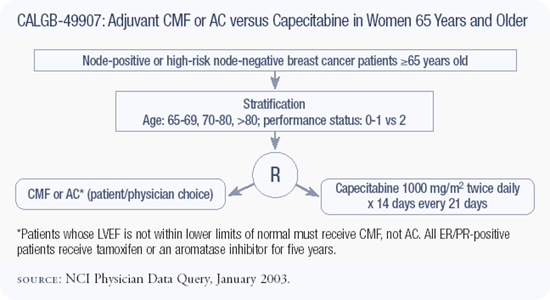You are here: Home: Special Report: 21st Annual Miami Breast Cancer Conference 2004:
E: Adjuvant Chemotherapy in the Elderly


| RESEARCH LEADER COMMENTARY |
 |
CALGB-49907: Adjuvant chemotherapy trial in elderly women
In my adjuvant trial for elderly ( >=65 years) women with node-positive breast cancer or high-risk, node-negative breast cancer, patients are randomly assigned to either standard chemotherapy or capecitabine. Because of the controversies about standard therapy, we gave doctors and patients the option of either CMF with an oral cyclophosphamide regimen or AC.
We have a quality-of-life assessment as part of the trial. We are looking at function and comorbidities, major issues in the management of older women with breast cancer in the adjuvant setting. We are also going to evaluate other issues including the biology of breast cancer and patient compliance. In a companion study with tissue blocks, we will look at HER2 and thymidine phosphorylase, which is related to the effect of capecitabine. This trial in older women may provide clues on how to predict which patients will benefit from which therapies.
— Hyman B Muss, MD
We did a small, randomized Phase II trial comparing intravenous CMF and full-dose capecitabine as front-line therapy in elderly patients in the metastatic setting. The response rate with capecitabine was 30 percent compared to 16 percent with intravenous CMF.
In a randomized Phase II trial of patients pretreated with anthracycline, comparing paclitaxel 175 mg/m2 every three weeks to full-dose capecitabine, 1,250 mg/m2 BID, two weeks on, one week off, the response with the capecitabine was 36 percent compared to 26 percent with paclitaxel. The confidence intervals were widely overlapping, so we couldn't conclude that capecitabine is superior, but what you can say from these two studies is that it's certainly unlikely that capecitabine is worse than CMF or paclitaxel.
It's interesting how quickly capecitabine has moved to trials in the adjuvant setting. In women over age 65, 75 percent have ER/PR-positive breast cancers. I think the role of chemotherapy in that group of patients is sufficiently unknown. Particularly for women over 70, the overview analysis includes so few patients in that age group that I think it's very reasonable to compare capecitabine to AC or CMF. I'd be a little less comfortable with it in a younger patient population, only because the overview has clearly shown that polychemotherapy is superior to monotherapy.
— Joyce O'Shaughnessy, MD
Select publications
|
